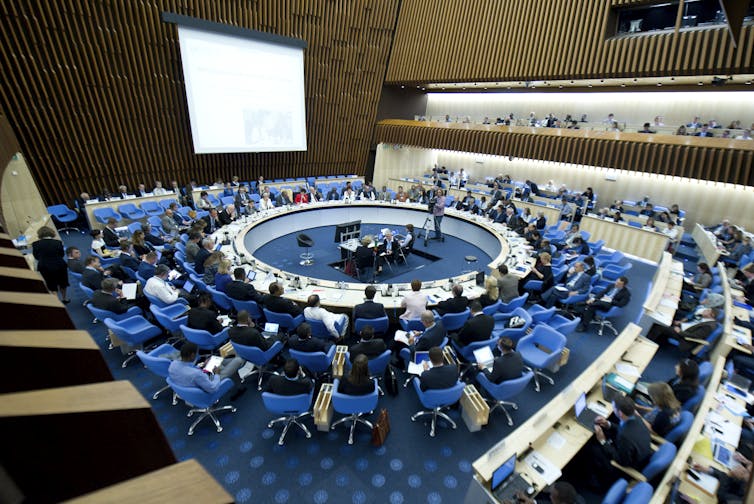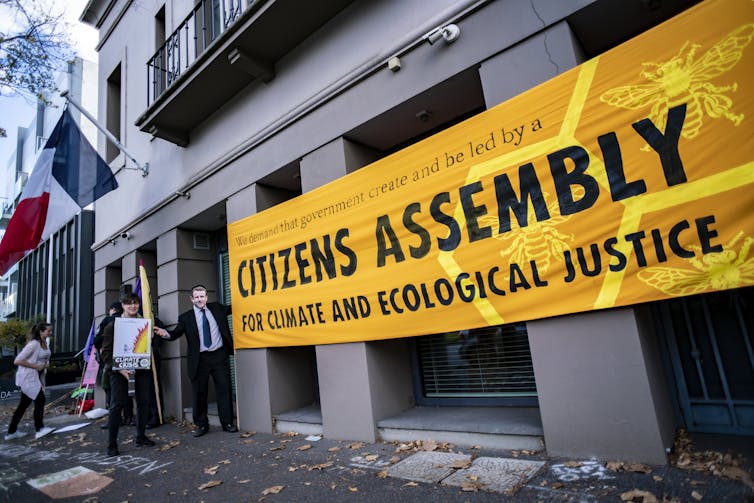
UNFCCC/Flickr
Governments across the world are facing increasing pressure to keep rising global temperatures below 1.5C above pre-industrial levels: the threshold that scientists advise is necessary to prevent the most destabilising consequences of climate change, including more frequent droughts, floods and wildfires.
The English city of Bristol’s ambitious One City Climate strategy aims to make the city fully carbon neutral and climate resilient by 2030. This includes decarbonising the city’s buildings, energy and public transport systems, and businesses.
Bristol is also one of the first cities in the world to commit to achieving a transition to carbon neutrality that is “fair and inclusive”. However, exactly how the city aims to achieve this remains unclear.
Taking Bristol as a case study, we embarked upon a year-long research project to examine the role of six organisations from the public, private, and civil society sectors in climate change decision-making. In particular, we were interested in how these organisations interpreted the idea of a “just” climate transition. This usually means ensuring that the benefits and costs of taking climate action are distributed between everyone – from workers to government leaders – and not heaped unfairly on underprivileged groups.
Our research employed a mixture of expert interviews and over nine hours of observing meetings. We found that although people clearly stated their commitment to achieving a just transition, ideas about what this meant in practice varied greatly. One participant remarked that “you don’t know what justice or fairness looks like to somebody else unless you ask”.

Free-Photos/Pixabay
What also rapidly became clear was the importance of securing more diverse participation in climate decision-making. Our findings revealed that climate discussions were dominated by white men, who spoke around 64% of the time. White women took the floor 33% of the time, and visible ethnic minorities spoke just 3% of the time. In comparison, Bristol’s ethnic minority population is 16%.
Many participants acknowledged the need to increase diversity in the climate space. However, it was pointed out by one participant that “the diversity within diversity is often overlooked”, leading to the misleading perception that views on climate among people from ethnic minority backgrounds were similar across the board.
If we are to achieve a successful zero-carbon future, the communities most affected by climate change should have a much greater say in how we do it. Groups including people with disabilities, working class people, youth, and older people – known as the “climate-vulnerable” – should be prioritised when consulting on climate strategies.
Public engagement
Our research also revealed the need to make information about climate impacts and policy proposals more widely available to the public. The way in which this information is framed matters. It shouldn’t be pitched solely to “educate” individuals – which can come across as patronising – but instead as a catalyst for discussion, outlining opportunities for local action.

Flickr/Matthrkac
Spreading this kind of information could be achieved by establishing citizens’ sssemblies. These bring together a sample of members of the public, who represent a range of backgrounds and identities, to debate and vote on key issues. These assemblies can offer important feedback to both local policymakers and community groups on their proposed climate plans.
Those who make decisions should also be held accountable through, for example, public forums and complaints systems. This ability to assess the outcome of leaders’ work is particularly important for members of climate-vulnerable groups. This is because their participation in decision-making and consultation processes themselves may be limited by structural barriers such as the accessibility of these processes, as well as time and financial constraints.
Looking ahead to the UN’s climate change conference COP26 in Glasgow, cities have an opportunity to lead by example through establishing truly inclusive climate consultations. This way, we can ensure that the voices of marginalised and climate-vulnerable groups are heard and that no one is left behind in our transition to a zero-carbon future.
———————————-
This blog is written by Cabot Institute members Dr Alice Venn, Lecturer in Law, University of Exeter and Dr Alix Dietzel, Lecturer in Politics, University of Bristol
This article is republished from The Conversation under a Creative Commons license. Read the original article.
 |
| Alice Venn |
 |
| Alix Dietzel |
Read all blogs in our COP26 blog series:

